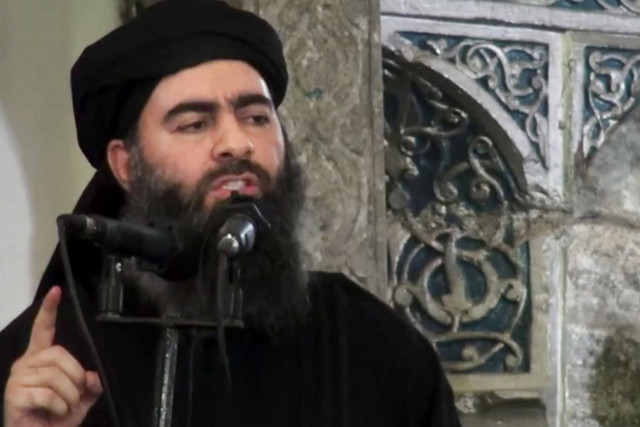It’s the question on the minds of many counter-terrorism experts: is ISIL Caliph Al-Baghdadi alive or dead? Those same experts have said the lack of leadership in his absence has rattled ISIL, but the extremism he inspired remains strong.
While al-Baghdadi’s fate is unclear, the global community’s focus remains the same: defeating terrorism.
CGTN’s Jim Spellman reports.
There are persistent rumors circulating that Abu Bakr al-Baghdadi, the reclusive leader of ISIL, is dead. The Syrian Observatory for Human Rights, a London based NGO, said he died sometime in the last three months in Eastern Syria. There has been no official confirmation from any government, including the United States.
“I am unable to confirm or deny where he is or whether he is alive or dead. Let me just say for the record, my fervent hope that it is the latter,” Lt. General Stephen Townsend said.
Al-Baghdadi has rarely been seen in public, but under his leadership ISIL grew from a regional terrorist group to a self-styled caliphate. They soon controlled swaths of land in Syria and Iraq, launching terrorist attacks around the world and inspiring lone wolves to take up arms.
“God ordered us to fight his enemies and to carry out jihad to achieve that and to spread the religion,” al-Baghdadi said.
If he is indeed dead, the future of ISIL is unclear. There are already signs of confusion and division. Some sources online claim a regional ISIL commander has declared himself the new caliph. Others claim there is infighting within ISIL about the group’s future.
The death of past terrorist leaders like Al-Qaeda-in-Iraq’s Abu Musab al-Zarqawi, or even Osama bin Laden, haven’t stopped the jihadi movement. The fate of al-Baghdadi may not be of much importance long term.
“I suppose it probably doesn’t really matter. If no one knows if he’s alive or dead, someone is guiding ISIS — the organization. And, what we’ve seen with all these paramount leaders is you take them out and someone else steps up,” Lt. General Townsend explained.
Regardless of al-Baghdadi’s fate, ISIL is being diminished on the ground. In Iraq, Mosul has fallen from ISIL control. The battle is also ramping up to drive ISIL (a.k.a. the Daesh) from Raqqa in Syria. New threats may emerge as fighters flee the area.
“Something like 40,000 people have gone to the Middle East to join this organization. Some of them will come home, some of them will try to resume normal lives and reject what they did with Daesh. Others will be, perhaps, these Trojan horse-type figures, ones that will be interested in carrying out terrorist attacks,” Joby Warrick, author of ‘Black Flags: The Rise of Isis’, said.
The international community is focused on making sure ISIL can’t gain ground again in Iraq, Syria or beyond.
“Curbing the flow of foreign fighters, countering ISIS finance, countering its false propaganda and focusing on areas where ISIS seeks to plant roots as its loses its phony caliphate in Iraq and Syria. We’ve made progress in all of these areas,”Brett McGurk of the Global Coalition to Defeat ISIL said.
Maintaining that progress will be difficult. Much of Mosul has turned into barren ruins after a bloody battle. It will take years of rebuilding to create the stability needed to stop new militant movements from taking hold.
What has been truly difficult to battle is the violent jihadi ideology that creates opportunity for figures like Abu Bakr Al-Baghdadi to come to power in the first place. The ideology has taken root and re-formed itself into new terrorist groups year after year.
 CGTN America
CGTN America
 FILE – This file image made from video posted on a militant website July 5, 2014, purports to show the leader of the Islamic State group, Abu Bakr al-Baghdadi, delivering a sermon at a mosque in Iraq during his first public appearance. (AP Photo/Militant video, File)
FILE – This file image made from video posted on a militant website July 5, 2014, purports to show the leader of the Islamic State group, Abu Bakr al-Baghdadi, delivering a sermon at a mosque in Iraq during his first public appearance. (AP Photo/Militant video, File)
